
Levi Olmstead

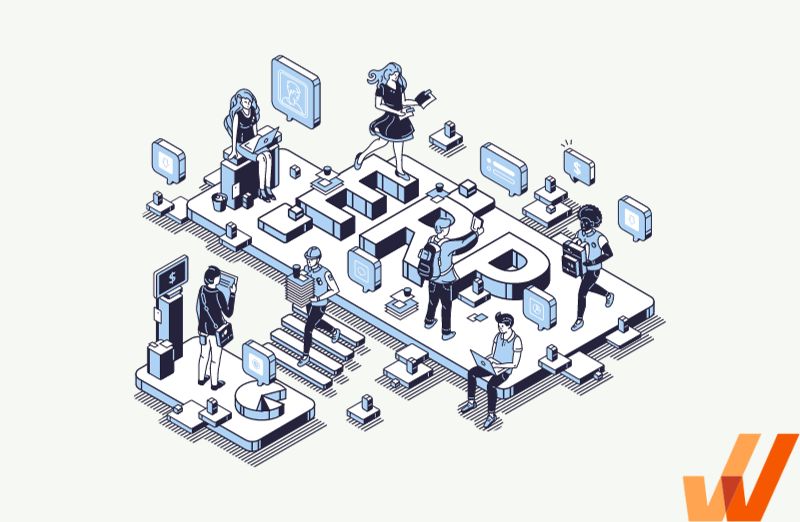
With a market size of nearly $50B in 2022, ERP systems are essential to any enterprise’s core business operations. As ERP transformation projects accelerate business growth and innovation, they come with unique challenges.
One critical IT challenge is the need for ERP end-user support. CIOs must enable their ERP end-users to maximize the value their organizations extract from an ERP investment with real-time support and contextual help – or face a failed ERP implementation.
In this article, we’ll explore how IT teams can enable their employees with moment of need ERP end-user support, all in the flow of work.
ERP end-user support is application support for your employees who use your ERP. It’s how they access and find ERP-related support to help them correctly use its workflows, accomplish their ERP tasks, overcome troubleshooting, and answer their ERP-related questions.
With the digitalization of enterprises, ERPs are integrated into hundreds of everyday processes that employees rely on to accomplish their tasks and do their jobs effectively. This means that traditional forms of ERP end-user support, such as SOPs, internal IT help desks, or simply asking a colleague for help, aren’t scalable in the modern, hybrid workplace.
This negatively impacts overall organizational efficiency and individual ERP end-user productivity, burdens IT and L&D teams, and ultimately leads to failed digital transformation due to poor ERP end-user adoption. It also has downstream effects, such as poor ERP data quality, compliance risks, and more,
Digital adoption platforms (DAP) provide organizations with a new solution to providing ERP end-users with contextual, on-demand support with in-app guidance and self-help. This enables ERP end-users to learn in the flow of work and empowers them with real-time support, at the moment of need, inside your ERP UI.
Here are just a few of the ways a DAP like Whatfix accelerates digital transformation and drives digital adoption with its in-app ERP end-user support:
While ERP vendors provide knowledge base articles and other end-user support formats and resources, these are generic. ERPs are highly customized by enterprises, with workflows being contextual to different end-users. This presents a challenge for IT teams to create contextual end-user support for its various types of users and internal roles.
With a DAP like Whatfix, enable your ERP end-users with in-app guidance that is contextual to each end-users based on their role, as well as where they are in an application, such as:
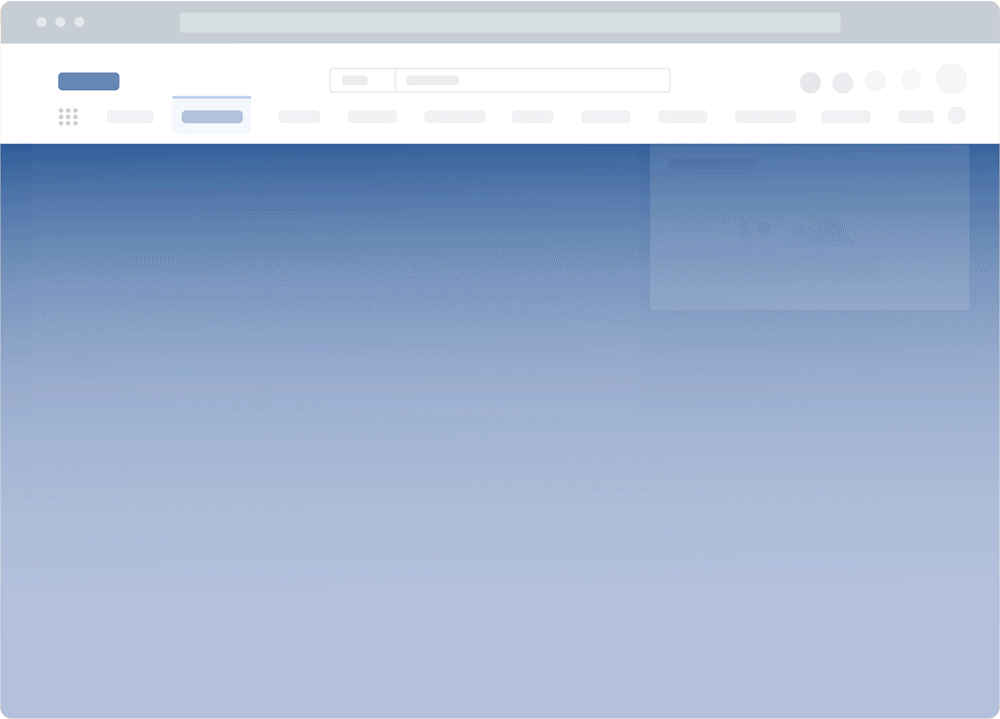
Whatfix’s Self Help provides an on-demand resource center that overlays your ERP UI, allowing your end-users to search for any help or support resource they need, at the moment of need, without leaving the application.
Self Help integrates with your IT Help Desk, SOPs, ERP training and ERP onboarding resources, third-party links, and more – aggregating it into a searchable self-help wiki. Attach Self Help entries to in-app guided Flows that are prompted when an end-user interacts with the widget. Analyze what your end-users are searching for and are experiencing friction with to identify areas of ERP improvement and new support resources to create.
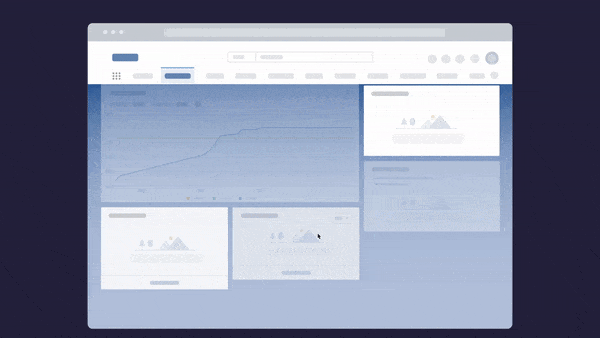
Above: Example of contextual help and user support built with a Digital Adoption Platform.
Whatfix’s Self-Help overlays on to any web application, desktop application, mobile app, or website. It provides contextual help to users and integrates with your FAQs, support center, LMS, user documentation, and more. Users are presented with common issues and help content for their contextual area in the application, or they can use an open-ended search to find the specific help content they’re looking for. These help support cards often prompt in-app guidance, walking users through the specific workflow they need help on.
Your ERP end-users may be distributed across the world. This presents challenges such as language localization, compliance and regulation requirements, and other regional issues. With Whatfix, automatically localize your ERP in-app support to your end-users, providing personalized support to each end-user. Whatfix supports over 50 languages, providing global content localization features that enable your global ERP end-users.
Post-ERP implementation, IT teams are faced with challenges on tracking workflow efficiency, testing ERP improvements, and optimizing ERP processes. Whatfix’s user behavior event tracking enables enterprises with a no-code solution to implement product analytics into their ERP to analyze ERP instances and make data-driven improvements.
With Whatfix Analytics, track ERP end-user behavior to map and optimize ERP user workflows, identify areas of user friction, segment end-users, monitor license usage, track any custom even, and drive ERP adoption with a data-driven approach.
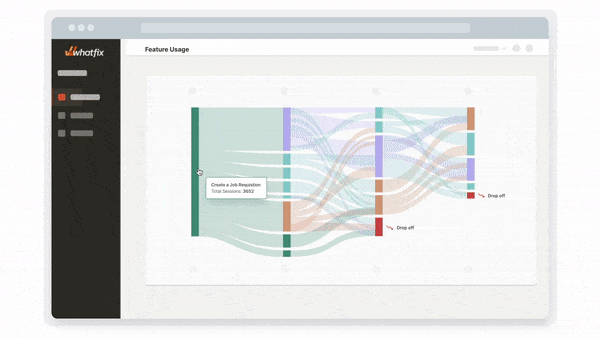
To see a DAP’s impact on enterprise software adoption and end-user support, let’s explore two Whatfix customer success stories from REG and Ferring Pharmaceutical.
REG drives its digital transformation by enabling employees with in-app, step-by-step guidance within the application (called ‘Flows’), which are used extensively to help users learn an objective or complete a task through a series of actions. This way, REG can break down complex JD Edwards, Salesforce, and other application journeys into intuitive steps.
REG uses Whatfix’ Self Help combined with in-application guidance to make internal knowledge available in real-time, inside its application UIs. This helps to create a self-learning culture, empowering REG employees to take charge of its application knowledge.
REG also makes data-driven adoption decisions with Whatfix Analytics. Whatfix enables its IT and L&D teams to understand user adoption and training effectiveness – using these insights to identify areas of user friction and to optimize CRM end-user support and ERP user flows and experiences.
With Whatfix, REG reduced application time-to-proficiency, deflected internal support tickets on application-related issues, reduced compliance errors, improved employee engagement, increased employee productivity, and drove overall software adoption.
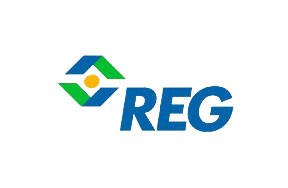
Abby Essing, Sr. Manager, Operations Services at Renewable Energy Group, Inc.
Ferring invested in a digitalization effort to transform its contract management with Icertis. To accelerate this transformation and enable its CLM end-users to their fullest potential with in-app guidance and self-service support.
With Whatfix, Ferring launched a knowledge repository with Whatfix Self Help, inside its CLM UI that enabled its end-users to find help documentation for troubleshooting issues and support-related questions without leaving Icertis, driving end-productivity. Its Self Help search success rate was 94%, deflecting the majority of Icertis-related workflow questions.
Ferring’s new contextual Self Help led to a 33% decrease in Icertis-related support tickets. Instead of fielding repetitive questions, it was able to focus on significant initiatives and less on resolving support tickets.

Sheila Dusseau, Head of Global Legal Operations at Ferring
With Whatfix, enable your ERP end-users with in-app guided experiences and real-time support, including:
Whatfix Analytics enables IT teams to make data-driven ERP end-user decisions by tracking custom user events, identifying friction areas, mapping optimal user flows, and more.
Software clicks better with Whatfix's digital adoption platform
Enable your employees with in-app guidance, self-help support, process changes alerts, pop-ups for department announcements, and field validations to improve data accuracy.
Thank you for subscribing!